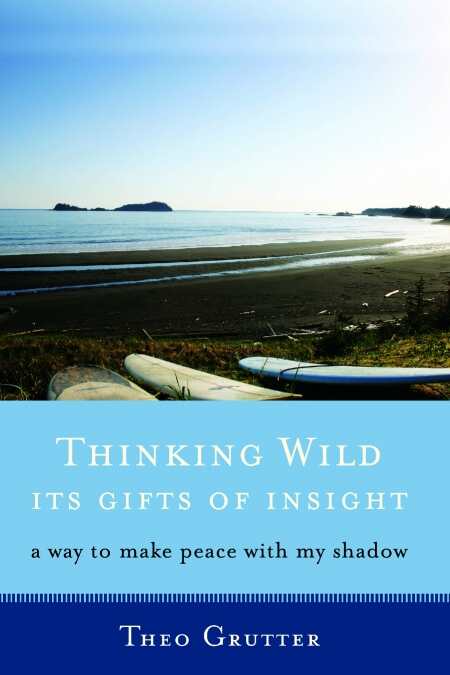Thinking Wild: Its Gifts of Insight
A Way to Make Peace with My Shadow
“Do people flock to your sunny beaches? Do they pack up and leave in prospect of a storm pelting them with complaints?” These are just two of the hundreds of questions Theo Grutter asks himself, and his readers, in Thinking Wild, a collection of essays and musings organized in no particular order and covering a wide variety of personal, ecological, philosophical, and moral themes.
A world traveler and fisherman who happily admits to having spent more than five thousand days and nights alone on the sea over the past forty-five years, Grutter is a modern Thoreau and the coastal waters off Alaska and Mexico are his Walden. The beautiful cover photo conveys why he loves his idyllic haunts.
Like Thoreau, Grutter sees the world as a classroom and nature as the teacher. When he advises in the second of his 115 essays that children should be “schooled outdoors,” it is not only to get them out into the yard but also to let them see the wonders and creatures of the natural world as their “guides and teachers.”
“The trees, the things alive, the streams, the skies, the pods of orcas, and the flocks of Canadian [sic] geese, all the locals, they know how to live in this place—ask them!” is Grutter’s advice—and his voice. Some may find Grutter and his writing naive, preachy, or trite as every essay is sprinkled with anecdotal sayings not unlike those found on the pages of Poor Richard’s Almanac or inside fortune cookies. Some stand out in bold type in little sidebars: “To be truthful is dangerous, to be nice is safe,” while others are embedded in the text: “Every creature is a different bundle of delights.”
For those with a penchant to doubt or denigrate, reading Grutter would be a waste; the only enjoyment they would get out of it would be in snarky criticism. Then again, Grutter thrives on criticism, which he calls “instant ice cream for my mind.” His book is for those who would “seed the air with your laughter” rather than “foul it with your cussing.” Readers of a similar bent will find his prose entertaining and effective.
Grutter’s essays, the longest of which is barely eight pages (most are half that or less), are lovely and thought-provoking. Some are light snacks, such as “Joy Laughs in a Zillion Different Ways,” while others are full, meaty repasts, such as “A Religion Fit for the Outdoors,” where Grutter ponders the meaning and role of God, faith, and “popular religions,” the latter of which he likens to “great fashion houses offering clothes for the mind, catering to the large crowd.”
This is not a book to be devoured in a day or a week. Grutter is best read when taken in tiny bites. One or, at most, two essays in a reading, like short prayers, allow for reflection in the form of sparking mental conversations to be savored and explored. Most of these essays would make decent sermons or editorials because they explore the human condition and the moral and mental forces that propel people toward either joy or destruction.
Grutter’s message is cautiously positive; it is rooted in what he has learned while he and his wife of at least five decades have moved about the world while raising five children. Like Thoreau, Grutter has heard a different drummer, one whose tune resounds in the beating of waves upon the side of his boat and which he offers up here to others, if they will listen.
Reviewed by
Mark McLaughlin
Disclosure: This article is not an endorsement, but a review. The publisher of this book provided free copies of the book and paid a small fee to have their book reviewed by a professional reviewer. Foreword Reviews and Clarion Reviews make no guarantee that the publisher will receive a positive review. Foreword Magazine, Inc. is disclosing this in accordance with the Federal Trade Commission’s 16 CFR, Part 255.

